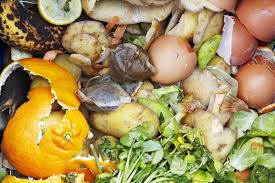Composting 101
Composting 101
What is composting?
Did you know that ⅓ of the food produced ends up in landfills?!
Food material in landfills turns into methane gas - a greenhouse gas that is 25% more potent than CO2!
Reducing food waste by composting is one of the solutions to this climate change nightmare!
Composting is a way of recycling food waste into a beneficial soil like material that can help reduce waste and save the planet! Composting takes organic matter (i.e. plant materials) and decomposes it using healthy bacteria and microbes to produce the ultimate plant food. Composting:
- Enriches soil health
Increases water conservation
Increase yields from garden
Increases bioavailability
Reduces waste & cuts methane gas production
Allows you to become an active participant in combating climate change!!
What can be composted?
Almost anything that comes from the earth can be composted. There are two types of materials: Green materials and brown materials. Greens are nitrogen rich items often referred to as “wet”. Browns are carbon rich items often referred to as “dry”
Greens Vs. Browns
Fruits and vegetable scraps Egg cartons
Egg shells (shells only, no other egg parts) Dried leaves/pine needles and grass
Coffee groups with filter Newspapers
Tea bags Cardboard and brown paper bags
Fresh leaves Saw dust
Grass clippings Hair/fur
Sticks and twigs
How to start a compost?
All you need is a little space, water and a shovel!
Choosing the right location: After you decide how big or small you want your compost to be, select an area that is out of the way but easy to access.
Choose the bin: You can choose to make a homemade bin using wooden or plastic box or purchase one already made.
Add the materials to the pile: alternate green and browns in a thin layer.
you will need to occasionally water the pile if :
- if you choose to add a lid to the pile
- If your area is experiencing long periods of drought or high temperature.
rotate the compost. Using a shovel or similar tool, occasionally turn and mix the compost to allow oxygen to enter the bin. The more you tend to the pile the faster it will become compost.
Feeling lazy? No worries! You can leave the compost alone, it just takes significantly longer.
Add finished compost to the garden, potted plants & yard. The finished product will be a light to medium brown fluffy soil like consistency.
What if you can't have a compost of your own?
-You can save your materials and donate them to a local organization like a community garden or composting facility in your area.
-Some areas may also have companies that provide pickup and drop off services for members. Rust Belt Riders is a great example in the NE Ohio area! (https://www.rustbeltriders.com/)
Gibbens, S. (2022, April 1). How to compost—and why it’s good for the environment. Environment. https://www.nationalgeographic.com/environment/article/how-to-compost
Natural Resources Defense Council (2020.). Composting [Photo]. https://www.nrdc.org/stories/composting-101, Us.
Simon, J. (2022, April 22). Composting can help fight climate change. Get started in 5 easy steps. NPR.org. https://www.npr.org/2020/04/07/828918397/how-to-compost-at-home
Shiffler, A. (2021). How to Start Your First Compost Pile [Photo]. https://www.lawnstarter.com/blog/lawn-care-2/composting-101-how-to-start-your-first-compost- pile/, us.
Wolfskehl, S. (2018). Black Earth Compost [Photo]. https://blackearthcompost.com/compost/, us.




.png)
I recently completed my Sustainability Project for my School Food Service rotation, and I definitely remember the Rust Belt Riders being a big help for those who want to compost in NE Ohio!
ReplyDeleteThank you for posting about composting. This is one topic that's been in the back of my mind (for awhile) to want to start but just haven't done the research- so this makes it far easier....thank you for that :)
ReplyDeleteI started my own garden this year and composting is my next task for next year. This little guide is super helpful. I can't wait to test it out! SG
ReplyDelete